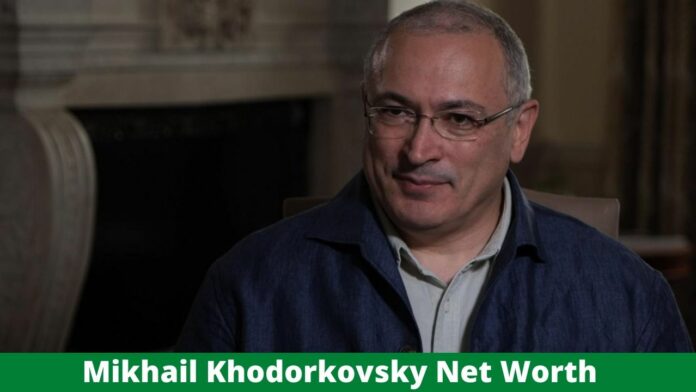Mikhail Khodorkovsky has a net worth of $100,000,000.
Mikhail Khodorkovsky is a Russian philanthropist and businessman with a net worth of $100 million USD.
Mikhail Khodorkovsky:
Mikhail Khodorkovsky (born June 26, 1963, in Moscow, Russia, USSR), Russian oil mogul and, at one point, Russia’s richest man, was imprisoned in 2003 on fraud and tax evasion allegations. He was convicted of these and other offenses before being freed in 2013.
Khodorkovsky was born into a middle-class household, the son of a Jewish father and a Christian mother. His parents were both chemical engineers, and they fostered in their son a love of science. In 1986, he graduated from Moscow’s D. Mendeleyev Institute of Chemical Technology, and he was a member of the Komsomol and the Communist Party. After being denied from graduate school, he pursued a career in business. Private business was promoted during Mikhail Gorbachev’s perestroika program, and Khodorkovsky engaged the assistance of his Mendeleyev Institute and Komsomol colleagues on a number of ventures.
Early and Personal Life:
Mikhail Borisovich Khodorkovsky was born in Moscow on June 26, 1963. Boris and Marina, his parents, worked as engineers at a plant that produced measuring equipment. His mother was of Russian Orthodox Christian descent, while his father was Jewish. His parents were anti-Communism but kept their views hidden from their son, who grew up to be a follower of Communism and a patriot of the Soviet Union.
He earned his bachelor’s degree in chemical engineering from Russia’s D. Mendeleev University of Chemical Technology in 1986. We were the deputy chairman of the Communist Youth League, known as Komsomol, at the time. He also met Yelena, a fellow student with whom he married and had a son. He later divorced his wife after seeing another young student, Inna. He courted her by staying in his automobile outside her apartment until she consented to date him. They later married and had three children together. He was also able to preserve a positive connection with both his first wife, Yelena, and his first son.
Career:
Khodorkovsky’s initial business was a café, which he founded in 1986, but by the following year, he had expanded his activities to include the import and export of computers and other commodities. In 1988, he coordinated the consolidation of many enterprises into a single trading entity, which was subsequently registered as a bank with an operating capital of around $8 million. Menatep, which was founded in 1990, was one of the first privately held banks in post-Soviet Russia. Following the demise of communism in 1991, Khodorkovsky amassed a fortune dealing in foreign money and commodities, but his most notable achievements were the acquisition of properties once controlled by the Soviet government.
Throughout the early 1990s, Menatep and its spin-off holding firm Rosprom acquired controlling stakes in dozens of Russian industrial enterprises. Menatep paid $350 million for Yukos, Russia’s second-biggest oil business, at a privatization auction in 1995. Menatep won the auction despite not having placed the highest bid. This can be explained by the fact that Menatep handled the bidding process as well, and that the highest proposal, submitted by a consortium of Russian banks, was excluded on a doubtful technicality.
As the chairman of Yukos, Khodorkovsky became the wealthiest person in Russia for a period, and he was one of the most conspicuous members of a group of impulsive industrialists and bankers known as “the oligarchs.” He navigated his expanding corporate empire through the 1998 national financial crisis at the cost of Menatep’s creditors. When the Russian government devalued the currency, Menatep, like many other Russian private banks, went bankrupt, and Khodorkovsky transferred Menatep’s recoverable assets to one of his other institutions.
He became a symbol of Russia’s rising, increasingly respectable corporate elite as his public presence expanded. However, Khodorkovsky and the other oligarchs had spent the majority of their political capital in Boris Yeltsin’s presidency, and his unexpected resignation in 1999 left them without the official protection and accommodation they had enjoyed for most of the previous decade. Vladimir Putin, Yeltsin’s successor, aggressively attempted to limit the oligarchs’ power, and in July 2000 he offered them a compromise: he would give them free reign in their individual businesses as long as they kept out of politics. Khodorkovsky turned down the arrangement and spent millions of dollars bolstering opposition to Putin and advocating laws favorable to Yukos.
Yukos announced plans in 2003 to purchase the Russian oil corporation Sibneft, becoming one of the world’s largest oil producers and Russia’s largest enterprise. Later that year, Khodorkovsky was imprisoned on allegations of fraud and tax evasion, putting an end to those ambitions. His trial lasted until 2005 when he was convicted on six of the seven crimes brought against him and sentenced to nine years in jail (this was later reduced to eight years). Khodorkovsky was charged with embezzlement and money laundering just before he would have been eligible for release in 2007.
The ensuing trial, like its predecessor, was widely denounced as politically driven. It culminated in a guilty verdict in 2010, and Khodorkovsky’s sentence was increased by seven years. That judgment was maintained on appeal in May 2011, however, Khodorkovsky’s overall sentence was reduced by one year, allowing him to be released in 2016. Despite Putin’s vilification of Khodorkovsky as an example of the worst excesses of the oligarch period, his imprisonment became a symbol for proponents of democratic reform in Russia.
Khodorkovsky was freed in December 2013 after serving more than a decade in prison. His pardon was part of a bigger amnesty in preparation for the 2014 Winter Olympics in Sochi, Russia. In July 2014, the Permanent Court of Arbitration (PCA) in The Hague decided that Russia had wrongfully taken Yukos assets as part of a politically motivated campaign against Khodorkovsky.
Despite the fact that Khodorkovsky was not a party to the litigation, Yukos shareholders were awarded over $51 billion in damages from Russia in one of the biggest international arbitration decisions in history. However, the verdict was reversed in 2016 by a Dutch court, which ruled that the PCA lacked jurisdiction.
Khodorkovsky departed Russia after his release and became a vocal opponent of Putin. In 2015, Russia issued an international arrest warrant for Khodorkovsky, who was accused, among other things, of orchestrating the murder of a Siberian mayor in 1998. He disputed the allegations. In 2019, Citizen K, a documentary on Khodorkovsky’s life, was released.
What Is the Exiled Russian Billionaire’s Net Worth?
Mikhail’s first job after graduating from university was with the Komsomol, which was the standard route for those hoping to enter Soviet politics.
Rather of gradually progressing through the ranks into a managerial position, he proved to be a good businessman, utilizing his Komsomol connections to help launch his first business, a cafe, in 1986.
Mikhail Khodorkovsky also made ties with significant institutions, allowing him and his associates to establish Bank Menatep in 1989, one of Russia’s first privately held banks.
The bank grew swiftly, and he was given the authority to administer the monies set aside for the victims of the Chernobyl nuclear disaster by the government.
Related:
- Warren Buffett Net Worth 2022, Income, Age, Wife – How did Warren Buffet get so rich?
- P Diddy Net Worth 2022, Income, Salary – How Rich is the American Rapper Actually in 2022?
- Satya Nadella Net Worth 2022, Income, Salary – How Rich is the CEO of Microsoft in 2022?
- Cain Velasquez Net Worth 2022, Income, Salary, Wife, Tattoo, Bio Wiki
- Kanye West Net Worth 2022, Income, Salary – How Rich is the Rapper Actually in 2022?
Arrest and Prosecution:
While initially part of the political elite, Khodorkovsky clashed with Russian President Vladimir Putin, who had him jailed and charged with fraud in 2003. This impacted not just Khodorkovsky, but also the Yukos oil business, which witnessed a significant drop following the freezing of its shares. Khodorkovsky was tried for his alleged offenses and found guilty in May 2005, receiving a nine-year jail term. He was accused of embezzlement and money laundering while serving his term, and his sentence was prolonged. Only until Hans-Dietrich Genscher fought for his release did President Putin pardon Khodorkovsky, who was released from prison in December 2013.
Khodorkovsky’s trial and sentencing were heavily attacked by the international press and governments, with many believing that his penalty was politically motivated. He filed many applications with the European Court of Human Rights, citing several cases of abuse of human rights by Russia. While the court found multiple infractions, it finally decided that the trial and arrest were not politically motivated.
Khodorkovsky departed Russia after his release from jail and was given residence in Switzerland before moving to London in 2015. While his fortune had reduced dramatically as a result of the controversy surrounding his arrest and time in jail, he was still a wealthy man by any standard, and his wealth soared when he relocated to London.
Open Russia:
Khodorkovsky founded Open Russia in the early 2000s with the intention of establishing a foundation to improve Russia’s civil society. To the chagrin of President Putin and the Kremlin, he revived Open Russian in 2014 as a statewide community portal.
The group pushes for free and independent media, the rule of law, political education, and more support for political prisoners. They aspire to ultimately implement broad reforms in Russia, such as those directed at law enforcement and elections. Khodorkovsky has stated that he wants Open Russia can serve as a conduit for a constitutional convention that will shift authority away from the presidency and toward the legislature and courts.
In 2017, Russia’s Prosecutor General’s Office labeled Open Russia as an undesirable organization, thereby prohibiting it and all of its related operations in the country. It was also included in Russia’s list of prohibited websites the same year. Fearing criminal prosecution of its members, Khodorkovsky declared that Open Russia will officially halt activities in Russia in 2021, however they will continue to operate elsewhere in the globe.

